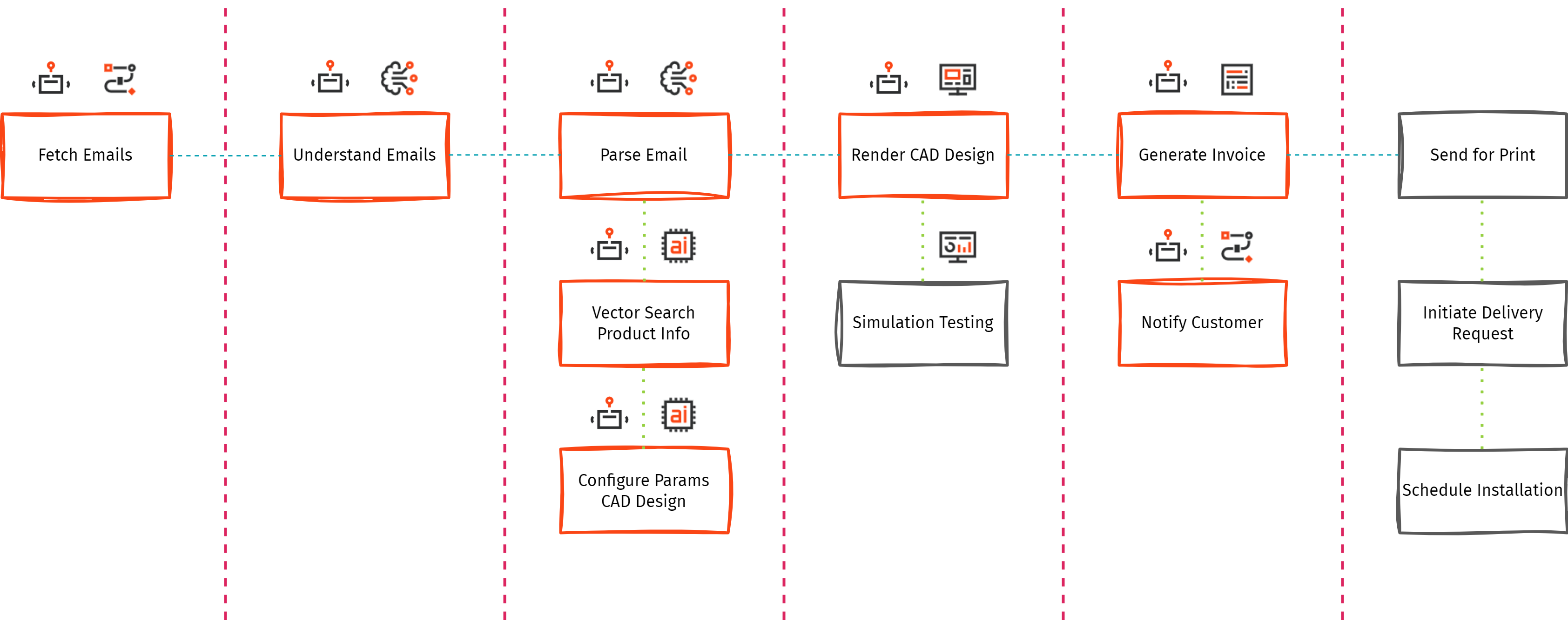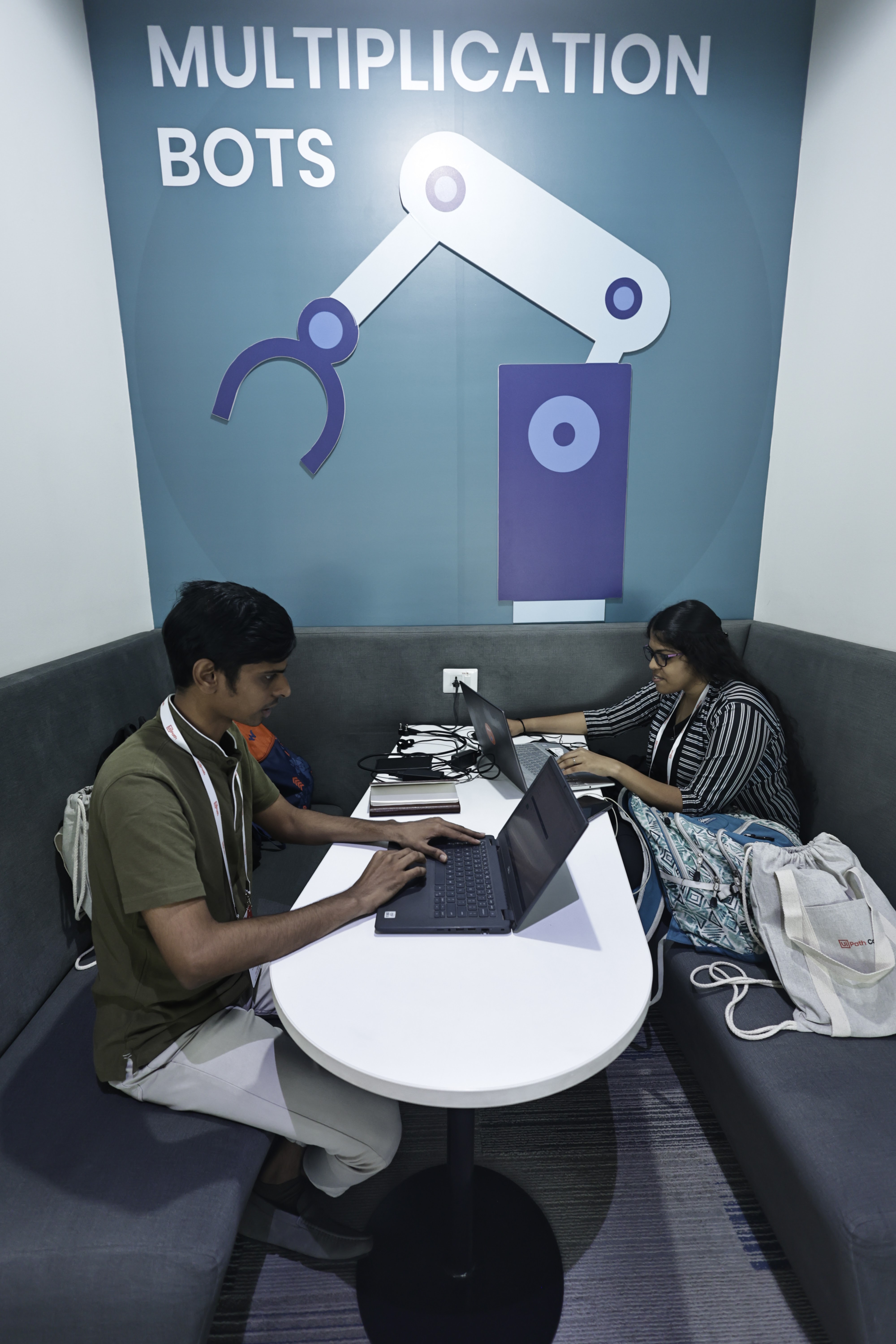The first facet of our vision aimed at reshaping the manufacturing industry,
confronting its persistent challenges. 'Autonomous Product/Component
Fabrication' wasn't merely a solution; it was our declaration of intent to
transform the landscape. By addressing manufacturing inefficiencies and
operational bottlenecks, we envisioned a future where every product is a
testament to precision, efficiency, and seamless automation. This side of
our vision sought to transcend the ordinary, pioneering a manufacturing era
defined by autonomous processes and unparalleled innovation.
The other side of the coin unveiled UiPath's extraordinary capabilities, far
beyond the routine tasks of scraping, Excel manipulation, and mail
monitoring.
We imagined a UiPath bot as not just a digital assistant but a dynamic
force.
-
Have you ever thought a bot autonomously steering a drone to accomplish
specific objectives.
-
Envision UiPath stepping into the realm of creativity, becoming an
artist capable of drawing, crafting poems, and even scripting.
-
Picture a bot transforming into an on-call agent, proficient in
resolving hardware issues—whether with your TV, IoT device, or any other
appliance.

|
Mr.Bot as the Pilot and Artist
|
In our unique exploration, we ventured into uncharted territory,
presenting a prototype where a UiPath bot autonomously undertook research,
designed components, and oversaw the entire product fabrication process.
This side of our vision was a testament to UiPath's potential to redefine
the boundaries of what a bot can achieve.
The Problem
To understand the problem, we first need a clear idea of what the As-Is
process of product component manufacturing entails.
The process primarily resides within the civil/mechanical domain, yet
its fundamental structure is broadly applicable across various
domains, with minor variations. It comprises three key entities: the
end customer, the service provider, and the manufacturer. Notably, our
focus lies predominantly on the service provider and manufacturer
sides of this intricate process. The end customer, desiring
installation or procurement, initiates the process by submitting an
order request to the service provider. Subsequently, the service
provider processes the order, executing a CAD design to determine
final costs, followed by the generation of an invoice. The approved
order is then forwarded to the manufacturer. Once the end customer
settles the payment, the manufacturing phase commences, culminating in
the delivery of units to the customer's location, where installation
takes place.
However, at each juncture within this end-to-end process, substantial
human effort is invested, grappling with operational inefficiencies,
enduring prolonged production cycles, and accommodating an escalating
demand for precision and scalability. Although human-intensive
workflows embody considerable expertise, their progress is impeded by
limitations in speed and repeatability.
Case Study On Perforated Plates
Let's delve into a real case study to gain insights into the domain, a
crucial step in understanding the upcoming technical aspects.
-- What is a perforated plate?
Perforated plates, versatile sheets crafted from metals or other
materials, feature an array of strategically placed holes, each designed
with specific specifications. These plates serve multifaceted purposes
across various industries, acting as integral components in
construction, engineering, and design. Beyond their structural
functionality, perforated plates are widely recognized for their
aesthetic appeal, offering a unique blend of form and function. The
deliberate arrangement of perforations not only allows for enhanced
airflow but also provides an artistic touch to architectural elements.
In applications ranging from acoustic panels to filtration systems,
perforated plates showcase adaptability, offering tailored solutions for
diverse needs.
There are a lot of manufacturers across the globe producing perforated
sheets at various volumes. Attached below is a sample catalogue. A
specific manufacturer is selling sheets with the specifications mentioned,
which will be further procured for installation.

|
A sample perforated metal plate catalogue from a
manufacturer
|
Now, a customer will place an order with a service provider to install
perforated sheets, whether for a building's partition wall or roof. The
service provider will gather details such as sheet brand and model
number, then create a design based on the product specifications
outlined in the manufacturer's catalogue. This design process determines
the required number of sheets and the total cost. Subsequently, an
invoice is generated, and the design is sent for fabrication, with the
manufacturer handling delivery. Finally, the construction team installs
the sheets according to the approved design, as shown in the image
below.
It's important to note that this is a high-level, simplified case
study, intended as a starting point for implementing automation and
driving innovation within this process. Similar to perforated
sheets, there are countless products in the market that undergo the
same process like wire mesh, cylinders, grating sheets, etc.

|
A building partition wall built using perforated plates
|
Understanding this domain knowledge provides a foundation, and now,
let's delve into the technical aspects to explore how automation can
enhance and innovate this process.
UiPath + (Gen)AI = Autonomous
UiPath synergizing with GenAI heralds the era of autonomy, where
intelligent automation seamlessly intertwines with the power of next-gen
artificial intelligence. Together, they forge a transformative alliance,
propelling industries towards unprecedented efficiency, innovation, and a
future where processes operate autonomously, guided by the brilliance of
advanced AI technologies.
Drawing inspiration from the
successful fusion of intelligent automation and advanced AI, our approach
envisions the creation of an autonomous system that seamlessly integrates
with the existing manufacturing landscape. By deploying cutting-edge
technologies, we aim to streamline processes, eliminate bottlenecks, and
empower the service providers and manufacturers with a transformative
toolkit. This synergy, marked by UiPath's unparalleled automation
capabilities and GenAI's cognitive prowess, charts a course towards a
future where component fabrication transcends human limitations, operating
autonomously with precision, speed, and adaptability. Our mission is to
not just innovate but to redefine the manufacturing paradigm, unlocking
new possibilities in the realm of autonomous product/component
fabrication.

|
UiPath Solution Architecture
|
The overall plan includes six main parts to smoothly handle different
aspects of the process: Communication Channel, Product, CAD Design,
Invoice, and Printer. Think of it like building blocks that work
together. UiPath Studio is where we create the step-by-step instructions
(workflows), and the Robot is like the doer that follows those
instructions precisely. Orchestrator is like the director making sure
everything is in sync. The Integration Service connects UiPath to emails
and AI tools for easy communication. UiPath AI Center adds a touch of
smart learning to the mix. We also include user-friendly GPT models like
GenAI and Bard, plus a creative tool called OpenSCAD for design. All
these elements come together to make autonomous component fabrication a
reality.
Communication Channel: We are considering email as the
communication channel for this use case, but, essentially, it can
originate from any source, such as a chatbot, request form, or e-commerce
platforms. We will utilize UiPath's integration service to seamlessly
connect to the mailbox, triggering automation based on mail events for
every email received. This approach allows us to instantly fetch all
emails, and their metadata will be added to the Queue for processing.

|
Order Email Request from a Customer
|
Email Classification: Once the email request is submitted for
processing, we need to categorize the email. This categorization helps the
automation bot determine whether the received email is an order request or
something else. To achieve this, we employ UiPath's Specialized AI with AI
center, utilizing either the text classification model or the NER model.
This process assists in accurately tagging the email under specific
labels.

|
Email Classification Result with UiPath Spl. AI
|
GPT's Magic: We leverage OpenAI's GPT to parse product information
from received emails. GPT seamlessly integrates with UiPath through the
Integration service, authenticated using an API key. The bot can then
communicate with GPT for any queries. In this process, it sends the email
content to GPT, extracting product data such as the ordered item, brand,
area dimensions for installation, and potentially its type along with the
delivery date.

|
UiPath Integration Service with Open AI
|
Following the extraction of product details from the email, the next
crucial step is to search for the product in the global catalog or
datasheet to obtain specifications using web crawling combined with
vector search. This step is paramount for designing the product into
specified area dimensions, whether it be a building roof or a wall. To
facilitate this search, we rely on Google's BARD AI, connected with
UiPath through an API service. This connection enables us to submit
queries with the product model number and brand, obtaining the necessary
product specs required for the design, including sheet length, width,
and hole diameter.

|
Product specifications in Manufacturer website which will be
fetched by BARD AI
|
CAD: Computer-Aided Designing, is a software
program that enables users to create and modify 2D and 3D designs. With
CAD, users can generate drawings, prototypes, and manufacturing
instructions. This forms the core, out-of-the-box approach in our use
case, where a bot is created to design a product based on various
parameters and smart AI intelligence. Now equipped with area details and
product specifications, including the perforated sheet, it's time to
generate a CAD script for rendering. We utilize the OpenSCAD open-source
CAD tool, where scripts and configurations are employed to generate
designs. OpenAI's GPT once again comes into play, generating the
OpenSCAD script based on parameters from previous steps.

|
OpenSCAD Script Metadata file by UiPath Bot with GPT
|
This script is then fed into the OpenSCAD Windows service to render the
product drawing according to the customer's requirements.

|
CAD drawing output by Bot: Single perforated sheet to the
left, Perforated sheet filled for the area dimensions to the right
|
**Simulation Testing: In CAD, simulation testing is vital for
validating product designs, assessing factors like structural
integrity and performance before physical implementation. Automation
transforms this process, enabling systematic and rapid execution of
tests. Popular simulation methods, including Finite Element Analysis
(FEA), Computational Fluid Dynamics (CFD), and kinematic simulations,
evaluate structural strength, fluid flow, and motion, respectively.
Leveraging automation frameworks, the CAD bot conducts these tests
seamlessly, ensuring that the designed product meets rigorous
standards. This accelerates the testing phase, enhances accuracy, and
contributes to the overall efficiency and reliability of the product
development lifecycle.
Invoice Generation: To create invoices, we utilize third-party
tools through an API request, where the bot transmits necessary
metadata. The third-party service responds by providing a PDF invoice
file, subsequently sent to the customer for billing.

|
One of the Invoice generated by UiPath Bot
|
**Send for Printing & Schedule Delivery: Manufacturing has
also embraced advancements like cloud or local printing, including 3D
printing and more. Now, the bot takes charge of the printer hardware,
whether via a local connection or cloud-controlled connectivity, to
transmit the product design file or metadata to the 3D printer and
initiate a print request. Simultaneously, it schedules delivery and
installation with the manufacturer, accomplished through a form in the
official portal or perhaps via a CRM.
**Plan for the future, not implemented at the moment.
This proof of concept serves as a testament to UiPath's versatility
and capability to revolutionize the end-to-end manufacturing flow for
product fabrication. The prototype showcases UiPath's prowess not only
in streamlining stringent operations like order processing but also in
addressing critical aspects of the manufacturing process, such as CAD
design and simulation testing. By seamlessly integrating automation
into these intricate processes, UiPath demonstrates its transformative
potential in enhancing efficiency, precision, and innovation within
the manufacturing industry. This marks a significant step towards a
future where UiPath plays a pivotal role in shaping the landscape of
automated and intelligent manufacturing.
Ready to be part of the revolution in how we create things?
Well, here's your chance! Our project is now Open Source,
available for everyone to contribute and get started. Join us in shaping
the future of manufacturing automation with UiPath. Your contributions
can make a real difference, making manufacturing smarter, more
efficient, and open to all. Why not jump in and be part of this exciting
journey?
Joining our project offers numerous benefits, not only for the
collective improvement of manufacturing processes but also for
individual growth. Contributing to our open-source project offers a
unique opportunity for skill enhancement through hands-on experiences
and real-world challenges. Engage in collaborative learning within a
global community, exchanging ideas and gaining insights across diverse
domains. Build a robust resume by showcasing your commitment to
innovation and community-driven development, while also enjoying
networking opportunities and making impactful contributions that leave
a lasting mark on the manufacturing landscape.
Universal Automation
Our project can extend beyond manufacturing, positioned as universally
applicable, it transcends industry boundaries, catering to domains
such as Automobile, Aeronautical & Defense, Electrical &
Electronics, and Civil & Architecture.
We explored a sample scenario in the automobile industry, attempting
to generate a gear based on a customer order request. Please note,
this is a very high-level example. Fortunately, the UiPath bot was
able to draft a gear structure by leveraging the entire solution flow
designed above. While the result may not be entirely accurate, it
demonstrates the bot's capability to generate a basic gear structure

|
CAD design of a helical gear with 20 teeth by UiPath Bot
|
Our future enhancements include,
-
Utilizing advanced requirement and behavior analysis, our upcoming
feature will intelligently recommend vendors, streamlining the
selection process for optimal choices tailored to your project
needs.
-
Before the physical fabrication process begins, our system will
conduct thorough stress and thermal performance tests, ensuring
robustness and reliability in your products. Stay tuned for a future
where perfection is tested before it's built.
-
We will also aim to minimize output distortions, ensuring
unparalleled precision and expanding the scope of possibilities.
Experience a new level of refinement as we fine-tune our models to
deliver optimal results for your automation needs.
-
Embracing the smallest units of automation, our project will be
transitioning to an 'Automation Atoms Framework' in near future.
This innovative approach breaks down complex processes into
elemental components, promoting flexibility, scalability, and
efficient orchestration. Each 'Automation Atom' functions as a
self-contained independent process, collectively forming a powerful
and adaptable automation ecosystem.
-
Acknowledging the diverse demands of the manufacturing landscape, we
will be elevating our design module to adeptly handle intricate
nuances like skew and design irregularities. This transformation
ensures it is exceptionally adaptive to the diverse challenges
presented by variations in design.
As we traverse the landscape of manufacturing innovation, our journey
with UiPath's AI Hackathon and the development of 'Autonomous
Product/Component Fabrication' unveils a transformative
chapter. We've explored the synergy between UiPath's cutting-edge
AI capabilities and the vast potential of automated
manufacturing. The Community Avengers, the Brainy Fools team, and
the collaborative spirit of the hackathon underscored the power of
organized innovation.
In closing, our journey doesn't end
here; it evolves. The path ahead holds exciting possibilities, and with
Universal Automation as our guiding principle, we stride confidently
towards a future where automation knows no bounds. Join us on this
remarkable expedition of innovation and transformation.
Want to experience the future of healthcare firsthand? Explore our
health care based open-source project, "Doctor's Assistant" and contribute to democratizing healthcare access through AI
innovation with UiPath.
Make sure to follow UiPath's official channels to stay updated on
the latest news, releases, and events. Subscribe to our blog,
follow our social media accounts, and join our community forum to
be part of the conversation and connect with like-minded
individuals. Stay ahead of the game and keep learning with
UiPath!


















No comments:
Post a Comment
Let me hear you 🙌✨